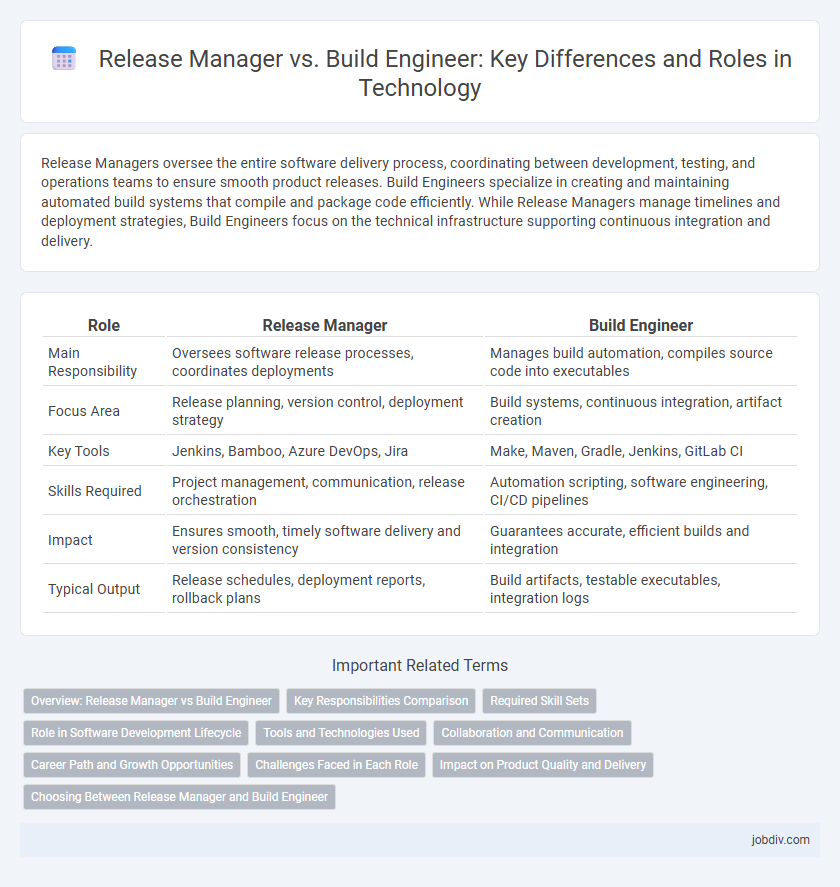Release Managers oversee the entire software delivery process, coordinating between development, testing, and operations teams to ensure smooth product releases. Build Engineers specialize in creating and maintaining automated build systems that compile and package code efficiently. While Release Managers manage timelines and deployment strategies, Build Engineers focus on the technical infrastructure supporting continuous integration and delivery.
Table of Comparison
| Role | Release Manager | Build Engineer |
|---|---|---|
| Main Responsibility | Oversees software release processes, coordinates deployments | Manages build automation, compiles source code into executables |
| Focus Area | Release planning, version control, deployment strategy | Build systems, continuous integration, artifact creation |
| Key Tools | Jenkins, Bamboo, Azure DevOps, Jira | Make, Maven, Gradle, Jenkins, GitLab CI |
| Skills Required | Project management, communication, release orchestration | Automation scripting, software engineering, CI/CD pipelines |
| Impact | Ensures smooth, timely software delivery and version consistency | Guarantees accurate, efficient builds and integration |
| Typical Output | Release schedules, deployment reports, rollback plans | Build artifacts, testable executables, integration logs |
Overview: Release Manager vs Build Engineer
Release Managers coordinate software deployment schedules, ensuring seamless transitions between development, testing, and production environments, while Build Engineers focus on creating and maintaining automated build systems to compile, test, and package code efficiently. Release Managers oversee version control, deployment pipelines, and rollback strategies, emphasizing project timelines and stakeholder communication. Build Engineers specialize in continuous integration (CI) environments, scripting build automation, and optimizing compiler configurations to enhance software delivery velocity.
Key Responsibilities Comparison
Release Managers coordinate software deployment schedules, manage version control, and ensure seamless integration across development, QA, and operations teams, optimizing the release pipeline for timely deliveries. Build Engineers design and maintain automated build systems, troubleshoot compile and integration errors, and streamline continuous integration processes to enhance software build reliability and efficiency. Both roles collaborate closely to guarantee robust software lifecycle management, yet Release Managers drive release strategy while Build Engineers focus on build system automation and stability.
Required Skill Sets
Release Managers require strong project management skills, expertise in version control systems, continuous integration/continuous deployment (CI/CD) pipelines, and effective communication abilities to coordinate cross-functional teams and ensure smooth software releases. Build Engineers must possess in-depth knowledge of build automation tools, scripting languages such as Python or Bash, debugging skills, and proficiency in configuring and maintaining build environments to optimize software compilation and integration processes. Both roles demand familiarity with software development lifecycle (SDLC) methodologies, but Release Managers focus more on orchestration while Build Engineers emphasize technical build processes.
Role in Software Development Lifecycle
Release Managers coordinate the software deployment process, ensuring smooth transitions from development to production by managing release schedules, risk assessments, and stakeholder communication. Build Engineers focus on creating and maintaining automated build systems that compile source code, run tests, and generate deployable artifacts to guarantee code quality and integration consistency. Both roles are critical in the software development lifecycle, with Release Managers overseeing release strategy and timing, while Build Engineers enable continuous integration and delivery through robust build pipelines.
Tools and Technologies Used
Release Managers primarily utilize tools like Jenkins, Bamboo, and Azure DevOps for continuous integration and deployment automation, while also leveraging version control systems such as Git and artifact repositories including Nexus or Artifactory. Build Engineers focus on build automation tools such as Maven, Gradle, and Make, alongside scripting languages like Python or Shell to streamline build processes and ensure software integrity. Both roles require expertise in containerization technologies like Docker and orchestration platforms such as Kubernetes to facilitate efficient software delivery pipelines.
Collaboration and Communication
Release Managers and Build Engineers collaborate closely to ensure seamless software delivery, with Release Managers coordinating deployment schedules and Build Engineers managing automated build processes. Effective communication between these roles streamlines troubleshooting and accelerates release cycles by aligning development, testing, and operations teams. Their synergy enhances continuous integration and continuous delivery (CI/CD) pipelines, reducing deployment risks and improving product quality.
Career Path and Growth Opportunities
Release Managers typically advance toward senior project management or product ownership roles, leveraging their expertise in coordinating software delivery and stakeholder communication. Build Engineers often progress into DevOps engineering or automation architect positions, capitalizing on their skills in continuous integration, build systems, and deployment pipelines. Both career paths offer growth through specialization in tools like Jenkins, Docker, and Kubernetes, with Release Managers focusing on release strategies and Build Engineers on infrastructure optimization.
Challenges Faced in Each Role
Release Managers often face the challenge of coordinating cross-functional teams and managing complex deployment schedules to ensure smooth software releases without downtime or errors. Build Engineers struggle with maintaining and optimizing automated build systems, addressing integration issues, and troubleshooting build failures to keep the development pipeline efficient. Both roles require deep collaboration and rapid problem-solving to mitigate risks and support continuous delivery in fast-paced environments.
Impact on Product Quality and Delivery
Release Managers coordinate deployment schedules and ensure seamless integration across development, testing, and production environments, directly influencing timely and reliable product delivery. Build Engineers automate and optimize compilation processes, version control, and continuous integration pipelines, thereby enhancing code quality and reducing build errors. Together, their collaboration strengthens product stability, accelerates release cycles, and minimizes risks associated with software deployment.
Choosing Between Release Manager and Build Engineer
Choosing between a Release Manager and a Build Engineer depends on project needs, as Release Managers specialize in coordinating software delivery and deployment schedules to ensure smooth releases, while Build Engineers focus on creating and maintaining automated build systems that compile source code into executable software. Organizations prioritizing streamlined release processes and cross-team collaboration benefit from hiring a Release Manager, whereas those needing robust continuous integration and build pipeline maintenance rely on Build Engineers. Understanding these roles helps optimize software development workflows by aligning responsibilities with technical objectives and team dynamics.
Release Manager vs Build Engineer Infographic

 jobdiv.com
jobdiv.com